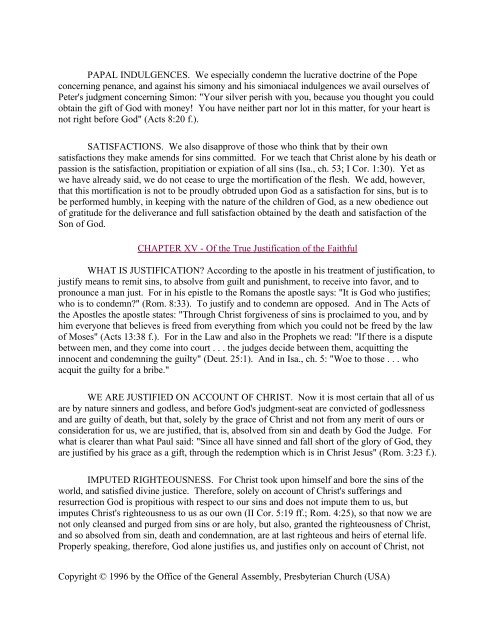The Book of Confessions - The Presbyterian Leader
The Book of Confessions - The Presbyterian Leader
The Book of Confessions - The Presbyterian Leader
You also want an ePaper? Increase the reach of your titles
YUMPU automatically turns print PDFs into web optimized ePapers that Google loves.
PAPAL INDULGENCES. We especially condemn the lucrative doctrine <strong>of</strong> the Pope<br />
concerning penance, and against his simony and his simoniacal indulgences we avail ourselves <strong>of</strong><br />
Peter's judgment concerning Simon: "Your silver perish with you, because you thought you could<br />
obtain the gift <strong>of</strong> God with money! You have neither part nor lot in this matter, for your heart is<br />
not right before God" (Acts 8:20 f.).<br />
SATISFACTIONS. We also disapprove <strong>of</strong> those who think that by their own<br />
satisfactions they make amends for sins committed. For we teach that Christ alone by his death or<br />
passion is the satisfaction, propitiation or expiation <strong>of</strong> all sins (Isa., ch. 53; I Cor. 1:30). Yet as<br />
we have already said, we do not cease to urge the mortification <strong>of</strong> the flesh. We add, however,<br />
that this mortification is not to be proudly obtruded upon God as a satisfaction for sins, but is to<br />
be performed humbly, in keeping with the nature <strong>of</strong> the children <strong>of</strong> God, as a new obedience out<br />
<strong>of</strong> gratitude for the deliverance and full satisfaction obtained by the death and satisfaction <strong>of</strong> the<br />
Son <strong>of</strong> God.<br />
CHAPTER XV - Of the True Justification <strong>of</strong> the Faithful<br />
WHAT IS JUSTIFICATION? According to the apostle in his treatment <strong>of</strong> justification, to<br />
justify means to remit sins, to absolve from guilt and punishment, to receive into favor, and to<br />
pronounce a man just. For in his epistle to the Romans the apostle says: "It is God who justifies;<br />
who is to condemn?" (Rom. 8:33). To justify and to condemn are opposed. And in <strong>The</strong> Acts <strong>of</strong><br />
the Apostles the apostle states: "Through Christ forgiveness <strong>of</strong> sins is proclaimed to you, and by<br />
him everyone that believes is freed from everything from which you could not be freed by the law<br />
<strong>of</strong> Moses" (Acts 13:38 f.). For in the Law and also in the Prophets we read: "If there is a dispute<br />
between men, and they come into court . . . the judges decide between them, acquitting the<br />
innocent and condemning the guilty" (Deut. 25:1). And in Isa., ch. 5: "Woe to those . . . who<br />
acquit the guilty for a bribe."<br />
WE ARE JUSTIFIED ON ACCOUNT OF CHRIST. Now it is most certain that all <strong>of</strong> us<br />
are by nature sinners and godless, and before God's judgment-seat are convicted <strong>of</strong> godlessness<br />
and are guilty <strong>of</strong> death, but that, solely by the grace <strong>of</strong> Christ and not from any merit <strong>of</strong> ours or<br />
consideration for us, we are justified, that is, absolved from sin and death by God the Judge. For<br />
what is clearer than what Paul said: "Since all have sinned and fall short <strong>of</strong> the glory <strong>of</strong> God, they<br />
are justified by his grace as a gift, through the redemption which is in Christ Jesus" (Rom. 3:23 f.).<br />
IMPUTED RIGHTEOUSNESS. For Christ took upon himself and bore the sins <strong>of</strong> the<br />
world, and satisfied divine justice. <strong>The</strong>refore, solely on account <strong>of</strong> Christ's sufferings and<br />
resurrection God is propitious with respect to our sins and does not impute them to us, but<br />
imputes Christ's righteousness to us as our own (II Cor. 5:19 ff.; Rom. 4:25), so that now we are<br />
not only cleansed and purged from sins or are holy, but also, granted the righteousness <strong>of</strong> Christ,<br />
and so absolved from sin, death and condemnation, are at last righteous and heirs <strong>of</strong> eternal life.<br />
Properly speaking, therefore, God alone justifies us, and justifies only on account <strong>of</strong> Christ, not<br />
Copyright © 1996 by the Office <strong>of</strong> the General Assembly, <strong>Presbyterian</strong> Church (USA)




